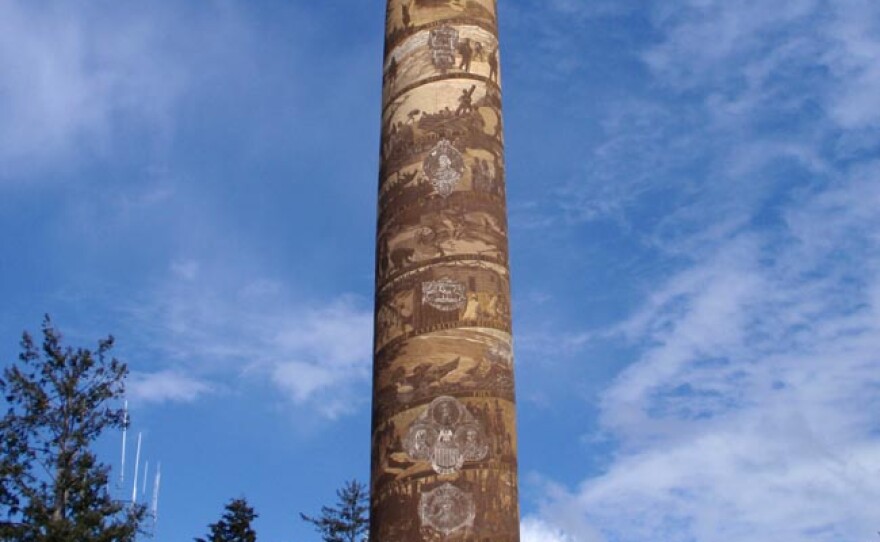http://stream.publicbroadcasting.net/production/mp3/kplu/local-kplu-969173.mp3
Quick, name the oldest city in the Northwest.
You get a gold star if you answered Astoria, Oregon. It is named for wealthy fur trader John Jacob Astor. The settlement at the mouth of the Columbia River celebrates its bicentennial this year. The official kickoff is this weekend [May 20-22]. KPLU's Tom Banse reports Astoria's founding has left legacies that span the whole Northwest.
I climbed the 164 steps to the top of Astoria Column. Through this door here onto the observation platform should be a grand view.
"Oh, wow. Magnificent! The wind is howling off the Pacific Ocean, but the Oregon Territory in its splendid springtime green spreads out as far as the eye can see. As you can tell, I'm speaking to you in American English, which is part of the reason why I'm here. My accent – in fact the whole region's accent really - could have been different with just a small twist of fate."
Why the NW Today is not Canadian - or Spanish or Russian
Canadian accented actress:
"Ya , you could've sounded like me! Ya can't have it all though, eh? S'okay , it's all still Greater British Columbia in our hearts. Good view up here. Can we have some of this back?"
Nope, sorry my Canadian friend. But it's worth remembering two hundred years ago the United States of America stopped at the Rocky Mountains. The British, the Spanish, Russians and Americans all had competing, overlapping claims on what's now Oregon, Washington and Idaho.
Mac Burns is executive director of the Clatsop County Historical Society.
"I always flat out say, and I firmly believe this, that without the Astor party in 1811, it is VERY likely that most of Oregon, Washington, probably parts of Idaho and maybe even further would be part of Canada today."
Astorians proudly proclaim – especially this year -- their city is the oldest American settlement west of the Rockies. It didn't stay American for long. Just two years after its founding, the early Astorians sold their outpost under duress to British fur traders.
A brand new exhibit at the Heritage Museum in Astoria explores the era. Mac Burns shows how the museum keeps two interchangeable flags handy.
"We're letting kids decide: do they want to part of the British Empire or do they want to be (with) Astor's Americans."
So the Union Jack just went up. And came down again.
Avoiding a Third Anglo-American War
It wasn't until 1846 that the British and Americans finally agreed on what is today the U.S.-Canada border.
Historians can differ on how much to credit those early Astorians for our present citizenship. The U.S. had other justifications to back up its territorial claim. Those included the earlier Lewis and Clark expedition and the later waves of settlement over the Oregon Trail.
Historian Rex Ziak says what makes the first Astorians special is not so much their territorial allegiance, but that their arrival signified a changeover.
"Page one of the new chapter - our chapter - of Northwest history begins with the Astorians. They come here not to look around, not just to make a map. They come here with the express purpose of building a settlement and staying here. They are the first to bring in domesticated animals -- pigs, sheep, goats, chickens, farm animals. They are the first in the whole Pacific Northwest to plant gardens."
Ziak and the bicentennial committee acknowledge Northwest tribes lived here long before the first pioneers showed up. This Saturday, members of the Chinook tribe will paddle out to the replica tall ship Lady Washington to re-create an early trading encounter.
On the Web:
Astoria Bicentennial 1811-2011:
http://www.astoria200.org/
Clatsop County Historical Society:
http://www.cumtux.org/
Rex Ziak's "Eyewitness to Astoria" (Moffit House Press, 2011):
http://www.astorianhistorian.com/1811/HOME.html









